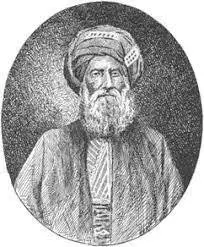
Those who went to Shanghai in China saw the Bund, the most touristic neighborhood of the city. Few people know that the name of the old business center of the city, where the most luxurious hotels and restaurants are located where the Yellow River curves slightly, comes from the Turkish (and Persian) word “bent”. Today I’m going to tell the story of two businessmen who left our land in the first era of globalization in the 1800s and became the richest people in the world.
David Sasoon was born in Baghdad in 1792, the eldest son of a Jewish family. His father Salih was the treasurer of the Ottoman governor. In his youth, David quarreled with local Ottoman rulers and fled to Mumbai, India. Thanks to the trade network he developed with the help of his fellow countrymen from Baghdad, he became the favorite businessman of the British in India. But luck would smile in David’s face in China. Opium planted in India was illegally sold to China. When one in ten Chinese became addicted to opium, the Emperor of China took drastic measures. With the lobbying of the smugglers, the British declared war on China and made the use of opium free. When China released opium, smuggling became meaningless, and David Sasoon, who knew how to trade best, became the head of the opium trade. He had learned neither English nor Chinese when he died.
David’s grandson, Victor Sasoon, spent all his money building the Bund neighborhood in Shanghai. Everything was in Viktor’s hands, from the city’s largest hotel, the Cathay (today the Four Seasons) to the utility company. At that time, the Bund was in a special status, like Galata or Alsancak in our country, where foreigners were subject to the law of capitulation. While the Chinese economy was integrated into the world through the Bund, Viktor Sasoon became the richest man in the world. However, Victor could not foresee the communist rule after the Second World War. All his property was confiscated. He spent his last days in the Bahamas.

Kalaust Gulbenkian was born in Istanbul in the same years as Victor Sasoon. His family was originally from Kayseri. He spent his childhood between Moda and his mansions in Adalar. After studying geology in London, he found his family’s jobs boring and started consulting on oil. Until that day, oil in the world was monopolized by American companies founded by Rockefellers. Gulbenkian realized that during the First World War, oil had become too strategic to be left to private monopolies, and that when the war ended, oil would be controlled by companies close to different states. He approached France, turned the main oil companies in the world into cartels through France, and shared the oil in the former Ottoman lands. Gulbenkian was called “Mr. Five Percent” because he received 5% from each deal. He went neither to Iraq nor to Saudi Arabia and made deals behind closed doors, making him the richest man in the world. However, his biggest fear was that his sons and daughters-in-law would get paid. His fortune collapsed when he died trying to arrange an inheritance that no one could afford to pay for in Portugal, where he fled because he was neutral in World War II. Today, the Gulbenkian Museum, one of the most beautiful museums in the world, operates in Lisbon with his wealth.
Both Sasoon and Gulbenkian had a good view of the emerging markets (China and oil) of the first era of globalization. They won by getting companies and governments together and doing business, producing almost nothing. Both used their relations in the lands they came from, but established their business under the hegemon power of that time, England.
While the new globalization that started in the 1980s stagnates today, it is useful to look back on these old experiences.

This article was published in Dünya Newspaper on 16 July 2020 .
More:
If you want to read more on vacation, two books released this year: “The Last Kings of Shanghai: The Rival Jewish Dynasties That Helped Create Modern China” by Jonathan Kaufman on Sasoons .
Regarding Gulbenkian, Jonathan Conlin’s “Mr Five Per Cent: The many lives of Calouste Gulbenkian.”





















